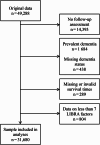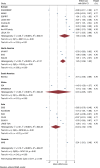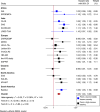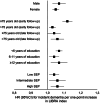Lifestyle and incident dementia: A COSMIC individual participant data meta‐analysis
- PMID: 38676366
- PMCID: PMC11180928
- DOI: 10.1002/alz.13846
Lifestyle and incident dementia: A COSMIC individual participant data meta‐analysis
Abstract
Introduction: The LIfestyle for BRAin Health (LIBRA) index yields a dementia risk score based on modifiable lifestyle factors and is validated in Western samples. We investigated whether the association between LIBRA scores and incident dementia is moderated by geographical location or sociodemographic characteristics.
Methods: We combined data from 21 prospective cohorts across six continents (N = 31,680) and conducted cohort-specific Cox proportional hazard regression analyses in a two-step individual participant data meta-analysis.
Results: A one-standard-deviation increase in LIBRA score was associated with a 21% higher risk for dementia. The association was stronger for Asian cohorts compared to European cohorts, and for individuals aged ≤75 years (vs older), though only within the first 5 years of follow-up. No interactions with sex, education, or socioeconomic position were observed.
Discussion: Modifiable risk and protective factors appear relevant for dementia risk reduction across diverse geographical and sociodemographic groups.
Highlights: A two-step individual participant data meta-analysis was conducted. This was done at a global scale using data from 21 ethno-regionally diverse cohorts. The association between a modifiable dementia risk score and dementia was examined. The association was modified by geographical region and age at baseline. Yet, modifiable dementia risk and protective factors appear relevant in all investigated groups and regions.
Keywords: age; dementia; dementia risk reduction; education; effect modification; ethnicity; individual participant data meta‐analysis; interaction; lifestyle; primary prevention; region; risk factor; risk personalization; sex; socioeconomic.
© 2024 The Authors. Alzheimer's & Dementia published by Wiley Periodicals LLC on behalf of Alzheimer's Association.
Conflict of interest statement
AL has received financial support to attend scientific meetings from Janssen. PG has received financial support to attend scientific meetings from Lundbeck, Esteve, Nutrición Médica, Angelini, and Neuraxpharm. DD reports grants from Shanghai Municipal Science and Technology Major Project (2018SHZDZX01) and ZJ LAB, National Natural Science Foundation of China (82173599, 81773513), Scientific Research Plan Project of Shanghai Science and Technology Committee (17411950701, 17411950106), and National Project of Chronic Disease (2016YFC1306402); all payments were made to the institution. QZ reports grants from the National Chronic Disease Project (2016YFC1306402), Shanghai Science and Technology Municipality (17411950106, 2018SHZDZX03, 17411950701), National Natural Science Foundation of China (82071200, 81773513), Shanghai Hospital Development Center (SHDC2020CR4007), and MOE Frontiers Center for Brain Science (JIH2642001/028); all payments were made to the institution. NS declares personal fees from NIH, grants from Novo Nordisk (not related to current manuscript). All other authors do not have any conflicts of interest to declare. Author disclosures are available in the supporting information.
Figures




References
-
- World Health Organisation (WHO) . Global status report on the public health response to dementia. 2021.
-
- World Health Organization (WHO) . Risk reduction of cognitive decline and dementia: WHO guidelines. 2019. - PubMed
Publication types
MeSH terms
Grants and funding
- AG03949/NH/NIH HHS/United States
- Netherlands Programme for Research on Aging (NESTOR)
- The Alzheimer's Association Zenith Award
- 2009BAI77B03/China Ministry of Science and Technology
- CRC2017ZD02/Clinical Research Center, Shanghai Mental Health Center
- 03/0815/Spanish Ministry of Economy and Competitiveness, Madrid, Spain
- R01 AG057531/AG/NIA NIH HHS/United States
- Greek National Resources
- DCP-2017-002/1/Universiti Kebangsaan Malaysia Grand Challenge
- 20H04030/JSPS KAKENHI
- Stiftelsen Professor Bror Gadelius' Minnesfond
- 01/0255/Spanish Ministry of Economy and Competitiveness, Madrid, Spain
- The Alzheimer's Association Stephanie B Overstreet Scholars
- AgeCap-Center for Aging and Health
- The Bank of Sweden Tercentenary Foundation
- European Social Fund
- HJSV2023023/Stiftelsens Hjalmar Svenssons forskningsfond
- 06/0617/Spanish Ministry of Economy and Competitiveness, Madrid, Spain
- Fondo de Investigación Sanitaria
- R37AG02365/NIH/NIA
- Instituto de Salud Carlos III
- Epilife
- 16/00896/Spanish Ministry of Economy and Competitiveness, Madrid, Spain
- B15_23R/Gobierno de Aragón
- B15_17R/Gobierno de Aragón
- G03/128/Spanish Ministry of Economy and Competitiveness, Madrid, Spain
- AG03949/NIH/NIA
- LRGS/BU/2012/UKM-UKM/K/01/Long-term Research Grant Scheme (LGRS) Ministry of Higher Education, Malaysia
- Limoges University Hospital Appel à Projet des Equipes Émergentes et Labellisées scheme (APREL)
- 189 10276/8/9/2011/ALZ/Alzheimer's Association/United States
- NMRC/1108/2007/National Medical Research Council
- 97/1321E/Spanish Ministry of Economy and Competitiveness, Madrid, Spain
- AG03949/AG/NIA NIH HHS/United States
- Swedish Brain Power
- FORTE
- 2012-Project Public Health Institute [Inserm]-PREUXPierre-Marie/AXA Research Fund
- National Strategic Reference Framework (NSFR) - EU Program Excellence Grant (ARISTEIA)
- PI16/00896/Fondo Europeo de Desarrollo Regional (FEDER) of the European Union "Una manera de hacer Europa"
- Shanghai Brain Health Foundation
- JP17K09146/JSPS KAKENHI
- NMRC/CIRG/1409/2014/National Medical Research Council
- AF-967865/Alzheimersfonden
- R37AG02365/NH/NIH HHS/United States
- HJSV2022059/Stiftelsens Hjalmar Svenssons forskningsfond
- 98/0103/Spanish Ministry of Economy and Competitiveness, Madrid, Spain
- RF1AG057531/NH/NIH HHS/United States
- Riksbankens Jubileumsfond
- Handlanden Hjalmar Svenssons Forskningsfond
- Stiftelsen för Gamla Tjänarinnor
- P01 AG003949/AG/NIA NIH HHS/United States
- IIRG-09-133014/ALZ/Alzheimer's Association/United States
- LRGS/1/2019/UM-UKM/1/4/Long-term Research Grant Scheme (LGRS) Ministry of Higher Education, Malaysia
- WT_/Wellcome Trust/United Kingdom
- Swedish Research Council
- Leonard and Sylvia Marx Foundation
- Maastricht University Medical Center
- 733050511/Netherlands Organisation for Health Research and Development (ZonMw)
- BMRC/08/1/21/19/567/Agency for Science Technology and Research (A*STAR) Biomedical Research Council
- Associazione Alzheimer Milano
- 2017-0557/Fondazione CARIPLO, FrailBioTrack Project
- DCP-2017-002/2/Universiti Kebangsaan Malaysia Grand Challenge
- PI/19/01874/Spanish Ministry of Economy and Competitiveness, Madrid, Spain
- 72660/ALF-agreement
- 12/02254/Spanish Ministry of Economy and Competitiveness, Madrid, Spain
- Ministry for Health and Social Solidarity (Greece)
- 94/1562/Spanish Ministry of Economy and Competitiveness, Madrid, Spain
- 01KS9504/Interdisciplinary Centre for Clinical Research University of Leipzig (Interdisziplinäres Zentrum für Klinische Forschung/IZKF)
- Czap Foundation
- ANR-09-MNPS-009-01/French National Research Agency
- Stiftelsen Söderström-Königska Sjukhemmet

